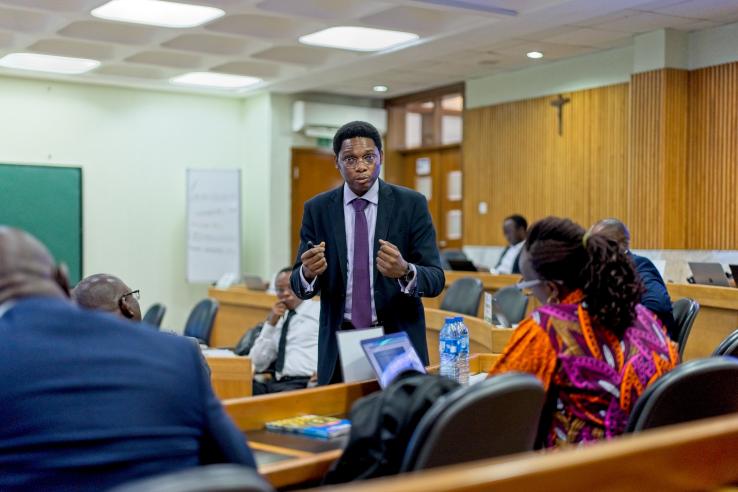
African Scholar Spotlight: Dr. Arinze Nwokolo

In this African Scholar spotlight, we speak with Arinze Nwokolo, Assistant Professor at the Lagos Business School in Nigeria. Arinze’s primary research interests focus on development, behavioral, and organizational economics as well as public policy, political economy, and finance.
What drew you into the field of development economics and working with impact evaluations in particular?
Development economics, especially in relation to Nigeria, has always been a focus for me. I studied Accounting and Finance before working as a financial manager and consultant, prior to pursuing my PhD at the University of Navarra in Spain. I was first introduced to randomized evaluations by Pedro Vicente, who was teaching development economics as an invited professor from Nova School of Business and Economics of the Universidade Nova de Lisboa. At the time he was actively conducting an impact evaluation in Nigeria, and it sparked my curiosity about similar work in Africa.
As I delved deeper into the subject, I became familiar with Esther Duflo’s impactful work in India and Africa. This is where my deep interest in the field stemmed from and I have dedicated myself to it ever since.
What are your broad research interests?
My research areas include development economics, labor economics, political economy, organizational economics, and corporate finance. I am particularly interested in understanding the root causes of conflict and terrorism, as well as ethnic discrimination, and some of my work explores strategies for reducing ethnic inequality. On the labor front, I am interested in interventions that can raise productivity, both for individuals and firms.
What are you using initiative funds to do? What research question are you trying to answer and how does it relate to your context?
I'm engaged in a pilot study with support from J-PAL’s Jobs and Opportunity Initiative to explore how cognitive behavioral therapy (CBT) can alleviate stress among female entrepreneurs. While extensive literature exists on employee mental health and strategies to improve firm performance, there's a notable gap regarding mental well-being enhancement for employers, particularly female entrepreneurs who frequently face significant stress and discrimination.
To bridge this gap, I'm implementing an intervention in Lagos that administers CBT through virtual reality specifically tailored for female business owners. The objective is to assess its effectiveness in reducing stress and determining if this leads to improved business performance. The intervention includes strategies like delegation, self-control, anger management, and enhancing understanding of interpersonal dynamics.
Currently, this project is in its pilot phase throughout Lagos state. If the pilot proves successful, we intend to do a full RCT with a larger sample of entrepreneurs. This endeavor holds promise for not only mitigating stress among female entrepreneurs but also potentially revolutionizing strategies for promoting mental health in the entrepreneurial context.
What do you see are the big unanswered research questions in your context that RCTs may be able to help answer? Does this relate to any projects you are excited to work on in the future?
There are lots of unanswered questions when it comes to labor and firms in Africa. I think we're still figuring out the best management practices for small businesses and the role of private equity investments. It's crucial to understand the effectiveness and long-term value of these management strategies, especially in key sectors like health and education, which can often struggle with management challenges. The growth of private equity investment in Africa is notable, but the driving factors and its impact on business growth and job creation remain unclear.
In the job market, attitudes toward work and a willingness to learn new skills are becoming crucial hiring criteria. Improving these characteristics could potentially boost youth employment, which is a persistent challenge. These topics are not just important for individual businesses but have broader implications across Africa.
How has the support you have received from J-PAL assisted you in your career? How can organizations like J-PAL continue to build on the support they provide to local researchers in running randomized evaluations?
J-PAL has been instrumental in my career development, especially through its networking and mentorship opportunities. I'm particularly grateful for the mentorship from J-PAL affiliate, Chris Blattman. His accessibility and responsiveness, along with constant project feedback, have been invaluable. He has also helped me navigate unexpected challenges, such as recruitment difficulties during national elections marked by violence. Chris's perspective on viewing initial rejections as a way to prevent later attrition and his emphasis on recruiting more participants for better engagement were game-changing.
His mentorship also highlighted that the challenges I faced were not unique, offering reassurance and learning from others who have overcome similar issues. It was a lesson in resilience and adaptation.
For future support, J-PAL and partner organizations could greatly aid scholars by fostering collaborations within and beyond its network. Working together not only enriches experience and confidence but also leads to higher-quality projects. This is particularly beneficial for local researchers in Africa, where networks are smaller and fewer people have RCT experience. My own collaboration within the J-PAL network, for instance, deepened my understanding of scaling up interventions, which is markedly different from piloting projects.
Do you have advice to offer other African scholars thinking about a career in economic research?
I encourage researchers to be ambitious in their work, and seek out substantial questions that can be addressed within the African context. There's a tendency to downplay the possibility of tackling significant questions, often because of the perceived need for extensive funding. However, organizations like J-PAL can play a vital role in supporting research that addresses relevant and impactful questions. It is important to identify the big question(s) that genuinely intrigue you because there are many important questions waiting to be explored, and by focusing on your particular area of interest, you can make a meaningful contribution.


